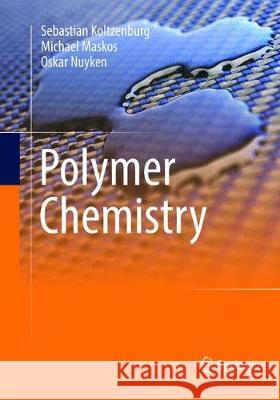Polymer Chemistry » książka



Polymer Chemistry
ISBN-13: 9783662569986 / Angielski / Miękka / 2019 / 584 str.
Polymer Chemistry
ISBN-13: 9783662569986 / Angielski / Miękka / 2019 / 584 str.
(netto: 307,40 VAT: 5%)
Najniższa cena z 30 dni: 308,41
ok. 16-18 dni roboczych.
Darmowa dostawa!
From the reviews of the German textbook "Polymere":
"Dieses Lehrbuch eignet sich für jeden, der in die makromolekulare Chemie der Kunststoffe vertieft einsteigen muss oder möchte. ... präsentiert das Buch ein leicht verständliches und dennoch tief gehendes Bild dieser sehr dynamischen und immer wichtiger werdenden Wissenschaft in der Schnittmenge von Chemie, Physik, Ingenieurwissenschaften. ... anschauliche, auch für den Laien gut verständliche Beschreibung der wichtigsten Verarbeitungsmethoden ..." (BB, in: wip Wissens- und Innovations-Netzwerk Polymertechnik, wip-kunstoffe.de, 31. Juli 2015)
"... Das Lehrbuch richtet sich an Einsteiger und Fortgeschrittene in der makromolekularen Chemie gleichermaßen. ... besonderes Bonbon für die Leser sind die mit Bedacht ausgewählten Experimentalbeispiele, die auf der langjährigen praktischen Erfahrung der Autoren beruhen und dem Leser beim Verständnis oder einfach beim Nachvollziehen des Stoffs helfen. ... eignet sich aber auch als Nachschlagewerk für Einsteiger in der Industrie oder für mittelständische Unternehmer, die sich mit Polymeren beschäftigen ..."(Andreas Greiner, in: Nachrichten aus der Chemie, Heft 7-8, 1. Juli 2014)
"... Das Werk enthält zahlreiche Abbildungen ... und Tabellen ... die gute Übersichtlichkeit bei der Darstellung chemischer Formeln und des Verlaufs von Reaktionen. Dieses empfehlenswerte Lehrbuch baut auf Grundkenntnissen der Organischen Chemie und insbesondere der Thermodynamik auf und richtet sich zum einen an Studierende der Chemie und bestimmter Studiengänge aus dem Gebiet der lngenieurwissenschaften, zum anderen an auf dem weit verzweigten Gebiet der Polymeretätige Forscher und Anwendungstechniker." ( Dr. Dieter Holmer, in: CLB, Jg. 65, Heft 7, August 2014)
Introduction and Basic Concepts.- Polymers in Solution.- Polymer Analysis: Molar Mass Determination.- Polymers in Solid State.- Partially Crystalline Polymers.- Amorphous Polymers.- Polymers as Materials.- Step-growth Polymerization.- Radical Polymerization.- Ionic Polymerization.- Coordination Polymerization.- Ring-opening Polymerization.- Copolymerization.- Important Polymers Produced by Chain-Growth Polymerization.- Chemistry with Polymers.- Industrially Relevant Polymerization Processes.- The Basics of Plastics Processing.- Elastomers.- Functional Polymers.- Liquid Crystalline Polymers.- Polymers and the Environment.- Current Trends in Polymer Science.
Dr. Sebastian Koltzenburg, Principal Scientist in Materials and Systems Research at BASF and Professor of Macromolecular Chemistry at the University of Heidelberg.
This comprehensive textbook describes the synthesis, characterization and technical and engineering applications of polymers. Offering a broad and balanced introduction to the basic concepts of macromolecular chemistry and to the synthesis and physical chemistry of polymers, it is the ideal text for graduate students and advanced Masters students starting out in polymer science. Building on the basic principles of organic chemistry and thermodynamics, it provides an easily understandable and highly accessible introduction to the topic. Step by step, readers will obtain a detailed and well-founded understanding of this vibrant and increasingly important subject area at the intersection between chemistry, physics, engineering and the life sciences.
1997-2026 DolnySlask.com Agencja Internetowa
KrainaKsiazek.PL - Księgarnia Internetowa









